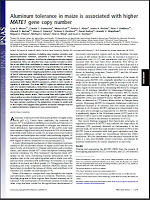A new study of maize sheds light on the importance of copy-number variation in genes related to stress tolerance with implications to boost crop yield in suboptimal soil environments.
A paper published in PNAS, “Aluminum tolerance in maize is associated with higher MATE1 gene copy number,” was published by senior author Leon Kochian and a team of scientists at the US Department of Agriculture, Cold Spring Harbor Laboratory, University of Arizona, and several other institutions.
The authors report on the discovery of aluminum stress-tolerance modulation through changing copy-number variation of a rare allele found in maize that has survived in highly acidic soils. Aluminum toxicity is the limiting factor for planting maize and other important crops on acidic soils, which comprise half of the world’s land that could be used for farming.
The authors state: “Only three maize inbred lines carrying the three-copy allele were identified from maize and teosinte diversity panels, indicating that copy-number variation for MATE1 is a rare, and quite likely recent, event.”
As part of the study, the PacBio® RS was used to analyze a BAC clone carrying three copies of the MATE1 gene previously associated with aluminum tolerance. The long-read data allowed the team to find that “the three MATE1 copies are part of a tandem triplication, with each repeat unit totaling nearly 30 kb in size.” The MATE1 copies shared sequence similarity and were flanked by transposon insertions.
The scientists conclude, “Our findings show a role for copy-number variation in the adaptation of maize to acidic soils in the tropics and suggest that genome structural changes may be a rapid evolutionary response to new environments.”
